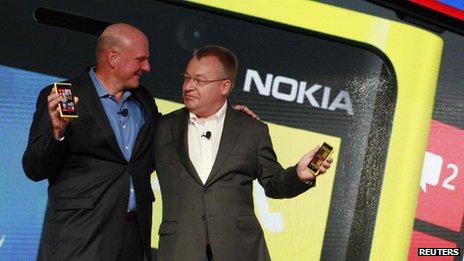Former Nokia boss Stephen Elop to receive $25m pay-off
- Published

Nokia launched smartphones using Microsoft software last year
Former Nokia chief executive Stephen Elop, will receive a $25.4m (£16m) pay-off when Microsoft's deal to buy Nokia's handset business goes through.
Under the deal, Mr Elop will receive 18 months of his salary and money from incentive and share schemes.
Mr Elop moved from Microsoft to run Nokia in September 2010 and will return to his former employer when the deal is completed.
Microsoft will fund 70% of his pay-off, which has sparked anger in Finland.
The nation's economy minister, Jan Vapaavuori, reportedly said: "I find it difficult to understand the merits of this bonus."
Earlier this month Microsoft agreed a deal to buy Nokia's mobile phone business for $7.2bn.
The purchase is set to be completed in early 2014, when about 32,000 Nokia employees will transfer to Microsoft.
Nokia shareholders are due to vote on the deal on 19 November.
In information provided for shareholders, external ahead of that meeting, Nokia explained in detail Mr Elop's compensation.
When the deal with Microsoft was signed on 3 September, Mr Elop agreed to step down as Nokia chief executive and take a new job at Microsoft when the deal is completed.
Due to that change Nokia says that he is entitled to 18 months of his salary and what Nokia describes as a "management short term cash incentive" which combined are worth $5.7m.
He is also entitled to share awards worth $19.7m.
Strategy change
When Mr Elop took charge at Nokia in September 2010 he became the first non-Finn to run the company.
In February 2011, he sent a warning memo to staff describing Nokia as a company standing on a "burning platform" surrounded by innovative competitors who were taking its market share.
Mr Elop decided that the company should abandon its own operating software for smartphones and instead use Microsoft's technology.
The first phones were launched in September 2012, but have failed to reclaim market share from Apple and smartphones running Android software.
- Published3 September 2013
- Published17 September 2013